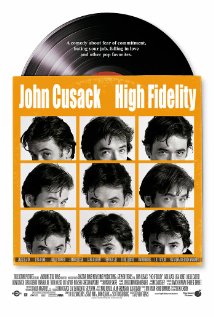How about Kevin Smith's breakthrough comedy, Clerks? If you have, you've probably figured out that they both feature protagonists who work in a shop of some sort, deal with romantic stress, engage in all sorts of hi-jinx with their colleagues, and tell a now-legendary "coming of age" story about how the main character comes to terms with their aging.
In High Fidelity, John Cusack's character Rob Gordon deals with a pretty miserable break-up. He cavorts with the employees he's hired to work his record store (dated? Perhaps!), and with their help he figures out how to set his life on a "better" path. He frequently talks to the viewer directly, opening the movie with the story of his Top-Five Breakups. There's the early-on elementary school disaster, the high school disaster, and the college disaster! Rob follows up with his past loves, trying to figure out what to do with his present despair. It's a funny tale, and it's got some great music in it to boot.
More renowned with the budding creator, however, is Clerks. Filmed by nerd legend Kevin Smith on a shoestring budget, at night, at the convenience store he worked at, Clerks is about Dante Hicks and Randall Graves, two miscreants (well, Randall is) who fuck around at work all day, play hockey on the roof, and - oh, yeah - have to come to terms with the fact that they are getting older. Dante's conflicted between two love interests, and in the end he has to deal with that problem, as well.
You're not here for a compare-and-contrast essay, though. There's thousands of points of comparison! There's equally as many differences between the two. None, though, are more stark than this one fact: High Fidelity is based on a 1995 novel of the same name by Nick Hornby. Did I know this when I first watched the movie? Nope! In fact, I have yet to read it.
But I have learned something from this contrast, and from both films put together: Stories change and become distant over time.
Statute of Limitations
Both stories are about young, disaffected men having relationship issues, employment disassociation, and general-old-lives. They have fun with friends! The events of each film (debates over music; debates over Star Wars) are pretty familiar to any twenty-something American male. It's a universal appeal that practically begs people to tell their own twist on it. And that's a danger to any writer - tropes are attractive because they're easy to fall into, but virtually impossible to pull off. You need, at the very least, a hook.
You also need to have something you can still relate to! After fifty or so years, you just won't remember the details. It becomes hard to remember exactly why your friend Billy was hilarious, and you'll have boatloads of difficulty explaining why the events of May 27th, 1997 were so incredibly awesome! And explaining it? To a reader, or a viewer? Even when you decide to twist the actual events and embellish it, you're still not doing anything more than patching the core of the story up.
Fiction often has a core of truth; writers draw from their lives all the time. They're stories about fake people, and the circumstances they find themselves in are only somewhat lodged in what can possibly be real. An autobiography, a personal narrative, a story about your youth? These contain facts, or at least are supposed to! But time adds a fog to certain things, and even well-kept journals and friends who retell their experiences will differ from your recollection.
The point, here, is the same as any other time you, as the creator of art, have an inspirational flash. If you plan to tell a story, tell it while it's rather fresh. Sure, you need a few weeks' removal from it, to really process what happened. In fact, sometimes even a couple years could benefit the wordsmith! But with each re-telling, each re-hashing, each passing minute, the raw impression of the incidents you were so enamored with become fainter and fainter. It's a balancing act, just like the act of editing and processing a story can fundamentally change it from it's more primal roots, waiting too long can cause your memory of an experience to go beyond crystallization and into fracture.
Sometimes, you just have to act.
